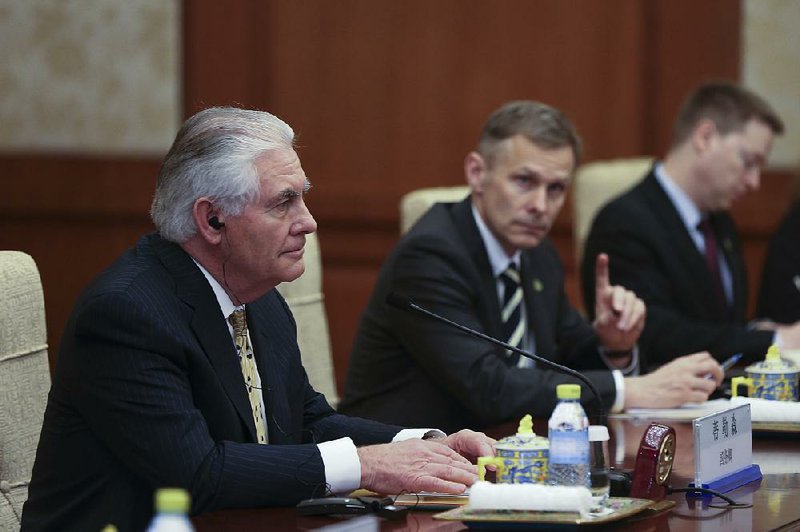BEIJING -- U.S. Secretary of State Rex Tillerson on Saturday pushed for closer China-U.S. cooperation on dealing with North Korea's nuclear program in his first face-to-face talks with top Chinese diplomats.
Tillerson's visit to Beijing came after Friday remarks in South Korea in which he warned that pre-emptive military action against North Korea might be necessary if the threat from its weapons program reaches a level "that we believe requires action."
China, the North's biggest source of diplomatic support and economic assistance, hasn't responded directly to his remarks, although Beijing has called repeatedly for all sides to take steps to reduce tensions.
Tillerson stressed the need for a "results-oriented" relationship with China in comments after his meeting Saturday with Foreign Minister Wang Yi.
"We renewed our determination to work together to convince North Korea to choose a better path and a different future for its people," Tillerson said.
He said Wang agreed on the need for a "course correction" with Pyongyang. Getting North Korea "to a different place" is a matter to be approached with "a sense of urgency," Tillerson said.
For his part, Wang restated Beijing's calls for dialogue between the U.S. and North Korea.
"No matter what happens, we have to stay committed to diplomatic means as a way to seek peaceful settlement," Wang said. "We hope all parties, including our friends from the United States, could size up the situation in a coolheaded and comprehensive fashion, and arrive at a wise decision."
Wang also called Tillerson's visit an important step toward a meeting between Chinese President Xi Jinping and his U.S. counterpart, Donald Trump, expected next month.
Tillerson met later with Yang Jiechi, Xi's top foreign policy adviser. He is scheduled to meet with Xi this morning before returning to the U.S.
China has grown increasingly concerned about the possibility of conflict on the Korean Peninsula.
Wang warned earlier this month that North Korea on one side, and the U.S. and South Korea on the other, were like "two accelerating trains" headed at each other, with neither side willing to give way.
He floated a proposal that North Korea could suspend its nuclear and missile activities in exchange for a halt in joint U.S.-South Korea military drills. That was swiftly shot down by the U.S. ambassador to the United Nations, Nikki Haley, who said Washington has to see "some sort of positive action" from North Korea before it can take leader Kim Jong Un seriously.
While China has agreed reluctantly to U.N. Security Council resolutions sanctioning North Korea, it is adamantly opposed to measures that might cause a collapse of the North Korean government and send waves of refugees into northeastern China while South Korean and U.S. forces take up positions on its border.
That's left Beijing with few options other than to call for renewed dialogue under the Beijing-sponsored, six-nation format that broke down in 2009.
In a further sign of its frustration with Pyongyang, China last month banned imports of North Korean coal for the rest of the year, potentially depriving Kim's regime of a key source of foreign currency.
On Friday, Tillerson signaled a tougher strategy toward North Korea that leaves open the possibility of pre-emptive military action.
"Let me be very clear: The policy of strategic patience has ended," he said after visiting the militarized border between the rival Koreas. "We are exploring a new range of diplomatic, security and economic measures. All options are on the table."
Past U.S. administrations have considered military force because of North Korea's development of nuclear weapons and ballistic missiles to deliver them, but rarely has that option been expressed so explicitly as by Tillerson.
North Korea has accelerated its weapons development, violating multiple Security Council resolutions without being deterred by sanctions. The North conducted two nuclear test explosions and 24 ballistic missile tests last year. Experts say it could have a nuclear-tipped missile capable of reaching the U.S. within a few years.
China has stridently opposed the deployment of a U.S. missile defense system to South Korea, saying its X-band radar can peer deep into China to monitor flights and rocket launches. The U.S. says it's a system focused purely on North Korea and poses no threat to the security of other nations.
Tillerson's visit to Beijing is the final stop on his three-nation swing through Northeast Asia, which began in Japan. State Department officials have described it as a "listening tour" as the administration seeks to coordinate with its Asian partners on a coherent North Korea policy.
Information for this article was contributed by Simon Denyer of The Washington Post.
A Section on 03/19/2017

